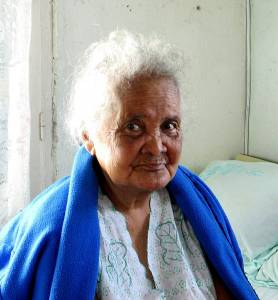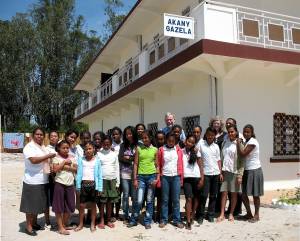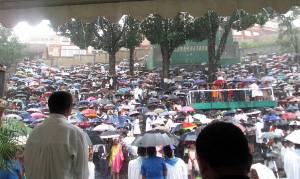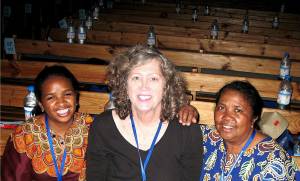A letter from Jan Heckler serving in Madagascar
February 2015
Write to Jan Heckler
Individuals: Give online to E200490 for Jan Heckler’s sending and support
Congregations: Give to D507556 for Jan Heckler’s sending and support
Churches are asked to send donations through your congregation’s normal receiving site (this is usually your presbytery).
I would like to begin this update by thanking all of those who correspond with me, read my letters, pray with and for our ministry in Madagascar, and who have supported this ministry with their giving. Without you there would be no ministry and it is important for you to know this. Your love is felt a third of the way around the world in many ways, including those that follow.
This has been a year with some new challenges for me ranging from having to recover from damaged/failed computers (twice) and engaging in my first interpretation assignment that brought me home to the U.S. to visit congregations and presbyteries. It has also been a year of new accomplishments including:
- Deepening and improving my relationships with staff of our partner church in Madagascar, the Church of Jesus Christ of Madagascar(or FJKM as it is abbreviated in Malagasy)
- Being asked to return to Madagascar to continue our mission for another four years
- Achieving outstanding results in completing the preliminary two-term demonstration of evidence-based methods of instruction (EBMI) in Antananarivo and being asked to help change over the 723 primary/secondary national school system of FJKM to using these methods (see separate section below which provides more information)
- Identifying and beginning the process of preparing the EBMI projects’ first senior teacher trainer/coaches
- Completing a grant proposal for $22,000 and otherwise helping to raise a total in excess of $25,000 on behalf of a number of FJKM prevention[1] programs serving women and children and then co-administering that grant to materially assist these programs and the people they serve
- Beginning my first interpretation assignment (IA)

Neny – Pastor Mamisoa’s maternal grand mother
Being invited back to Madagascar at the conclusion of my first mission appointment was important for a number of reasons, not least of which being that invitations by our partner churches are always required before PC(USA)/World Mission considers placing or continuing a mission co-worker. But for me it was also an important statement of acceptance and recognition among people of FJKM I was just meeting for the first time not very long before. So it was spiritually and professionally uplifting to receive such an endorsement; a wonderful moment in my life, to say the least.
The EBMI project, the prevention program grant, and participating in my first IA to me were also salient areas of achievement. The EBMI work and grant are important because of the potential amount of ‘good’ they could bring to the lives of the people who make up the FJKM. And IA is valued for forging new relationships and strengthening existing ones with people in our congregations.
IA fosters interactive, mutually beneficial partnerships between the people of our congregations and those abroad. IA calls on missional congregations to pour their life energy into mission work—their prayers, their interactive relationships, and their financial support; for truly with this lifeblood, to paraphrase James[2], will our missional faith come to missional life!
Program Grant Helps Fund Prevention Programs
The Program Grant provided desperately needed financial support for a number of FJKM prevention programs. In some cases grant monies enabled these programs to endure a particularly austere period in Madagascar when pew donations on a per capita basis are believed to be at an all-time low. This most difficult period is evidenced in part by the fact that 23 of 25 Malagasy survive now on just $2/day or less and many Malagasy are malnourished. In other instances programs were able to use the assistance to make key improvements in the quality of the services being provided.

Akany Gazela – 5 NOV 2012 visit with Doug Tilton
An example of this latter kind of gain occurred in FJKM/Dorkasy’s Akany Gazela program, in which library shelves, tables, chairs, books and a new computer were purchased to augment the after-school study and personal enhancement portion of the program’s activities. Tutors were also hired to help the girls ready themselves for final exams.
Prevention work by FJKM’s various programs for women and children center around strengthening the individual through church, family and community ties. So spiritual, familial, economic and group strengthening and enabling are key. FJKM’s prevention programs are operated by both its women’s division (Dorkasy) and the Chaplaincy for Marginalized People (SAFFIFAA) and include programs like Akany Gazela, Ambaniakondro, Tabita, and St. Marie. Here is a brief description of each:
Akany Gazela – Akany Gazela is a home for secondary school girls in Moramanga (a two- to three-hour drive east of Antananarivo) operated by Dorkasy. Girls come to this program from their families’ home communities to live and study because their own rurally located communities do not have the senior portion of a secondary school (or, in some cases, no secondary school whatsoever) for them to attend at home. Coming to a large city like Moramanga places the girls at high risk for human trafficking, sexual tourism and prostitution, drug use, early marriage, STDs and/or teen pregnancy. Akany Gazela was established to fight these ills while preparing young women for their adult lives in a safe, home-like, Christian environment.
Ambaniakondro – Ambaniakondro is home to more than 50 women and children (and three men) who left their tribal birth homes and villages due to gender-based, violent oppression. Since the Chaplaincy for Marginalized People (SAFFIFAA/FKJM) answered their mid-2013 call for help, this community has built a new temporary school, a permanent church, and has established 21 small businesses that are owned and operated by the women.
Tabita – Tabita is an Antananarivo-based program also operated by Dorkasy that fights domestic violence against women and supports all things ‘family.’ Tabita offers counseling services, small focus groups on a variety of domestic topics, and education and training alternatives primarily for adult women.
St. Marie – Because of this island’s ease of access by tourists, its extreme poverty, and its low rate of literacy, St. Marie has become a target for human trafficking and is used as a ‘stepping-stone’ to the Mid-east for human traffic originating in larger cities on the mainland of Madagascar. St. Marie Island is located just off the eastern (ENE) coast of Madagascar. It also has become a key tourist stop for many from Western Europe. Regrettably, too many of these tourists come to have sex with the young girls of this island in prearranged liaisons. Thus, not only human trafficking but sexual tourism are among the ills awaiting unsuspecting young people who, most often, are young girls.
Life changes are made in the girls who are seduced into human trafficking scams or the apparent ‘quick and easy money’ of sexual tourism. Because these life changes are most often severely negative and permanent and because those directly affected often become inaccessible to curative efforts, prevention has become the primary strategy for protecting young people from these terrible influences.

Antsahamanitra out-door arena – worship in a downpour
FJKM has two SAFFIFAA-operated, St. Marie-based prevention programs—Agniribe and Belangoro. Like Ambaniakondro and Akany Gazela, Agniribe and Belangoro approach their prevention work by strengthening young people’s social ties to their family, community and church as these are some of the most successful ways of dealing with the kinds of ‘risk’ factors that face young people there. Some of the most prominent of the social ills being addressed include: early (often teen) pregnancy, sexually transmitted diseases, drug and alcohol abuse and dependency, violence, and law-breaking of any type in addition to human trafficking and sexual tourism.
EBMI – Evidence-Based Methods of Instruction
The EBMI project is important because improving the quality of education is a primary means by which the Presbyterian Church (U.S.A.) is attempting to address the root causes of poverty (one of its three critical global initiatives [CGIs]). Evangelism, including bringing the good news of God’s love to school-aged children, is a second CGI addressed by the EBMI project. This conclusion is drawn in part because the curriculum in Madagascar includes religion. Naturally children who learn better, read better, comprehend and remember better, etc., will understand religion, religious beliefs and spirituality better than others. Thus improving learning will make for better students of the living word of God.
Right now FJKM schools average only 60 percent in giving correct answers on cumulative final exams, across all grades and subjects. Students are failing to learn many things that they need in order to succeed in the subjects of the following year’s grade. Saddled with an increasing deficit of critical knowledge every year that a learner is in school, the probability for school-leaving for many increases to a most regrettable level. However, the promise of EBMI is that academic performance will be substantially higher once the methods have been systemically adopted. Estimates of how well learners will learn at that time range from average learners’ achieving 80 percent (instead of 60 percent) on cumulative exams or higher; up to and even including 90 percent.
EBMI Demonstration Project. The ‘demonstration’ of EBMI in Madagascar (Jan.-July 2014) was simply that: an ‘illustration’ for administrators and decision-makers so that they could see ‘some’ EBMI in action. FJKM and PC(USA) administrators attended a briefing and showcasing of the methods in May 2014.
Because of funding limitations for the demonstration, only a single classroom (grade one, math) provided the actual demonstration, which lasted just two academic terms. Class averages of learners who were in the class the full term on cumulative final exams were 90 percent and 97 percent, respectively, for the two terms. Because of teacher interest, other teachers at the same school were invited to participate but were and are not the focus of the demonstration, which is now concluded.
Field-Readiness Preparation for Systemic Change. Training of teachers at that school continues on a limited basis and work with those teachers’ classes is still ongoing, but only as a side product or collateral benefit being received from the primary emphasis of the work being done. which is to train senior level project administrators from FJKM who will ‘own’ the project one day in EBMI. These teachers and classes are also being used for project administrators, including this mission co-worker, to learn more about:
- The FJKM curriculum as it is taught
- Informal aspects of education as done in Madagascar
- and how to:
- Refine strategies for applying the methods with the FJKM-based curriculum
- Solve systemically important problems and issues
- Begin developing standardized training materials for teachers and teacher educators
While most of the problems so far identified have had fairly straightforward solutions, occasionally there have been system/cultural issues that have surfaced that will require a different set of solution-creation tools. Examples of this kind of problem are:
1) Instructional language. The routine use of French to teach early grades before the learners actually know French. International studies and the World Bank strongly suggest that mother tongue languages should be used exclusively through the first eight grades to convey lessons and new material. French or other foreign languages would/could still be taught, but this would be done separately, say from teaching math or history. However, this is not the practice in Madagascar. Reasons for this are multiple but include:
- The fact that a weakness in a new foreign language when used to teach can only compound the learner’s problem of understanding new knowledge or skills being presented.
- The fact that the teacher’s ability to identify where a problem in learning may be occurring or what factor(s) is(are) causing it is made many times more complex when the actual mediating language is brought into question as possibly being a problem. At this writing, it appears Malagasy educators are fairly wedded to this practice.
2) Entrenched pedagogical practices. Most teachers and parents are also committed to the idea of using entire class periods to write ‘lessons’ on the blackboard only for the learners to copy them into notebooks. Of course this leaves almost no time for actual instruction. Then, the next day a new lesson is presented.
These lessons accumulate in a learner’s notebook and are supposed to act like a text. However, the effort to do this leaves almost no time for teaching, assessment or problem -solving. Changing these and other systemic/cultural preferences will require new insights and more problem-solving tools than just an evidentiary basis for the methods in order to work.
Additional Benefits of EBMI. The huge improvements in academic achievement that will hopefully be achieved after systemic adoption of EBMI will lead to improvements in the quality of life experienced by FJKM school graduates. Also, as these methods diffuse into the national Malagasy educational environment and improved methods are used in other private and public school systems, reductions in poverty and advances in development are hoped for as well.
Despite the anticipated length of this systemic change effort (thought now to be in the six- to eight- year range), it is believed to be most worthwhile since improved education has been linked to many benefits and meaningful improvements in the quality of life of people, including:
- Increasing/Improving:
- Productivity
- Income
- Economic growth
- The distribution and use of income
- The health of children
- The speed at which nations develop
- While reducing:
- Infant mortality
- Total fertility rates
- Malnutrition
- STDs, including HIV/AIDS
Personal
I am happier than ever to be in service of God and our church with the people of FJKM; people whose faith allowed around 4,000 to stand in the open, hard-driving rain in January 2014 in order to receive communion (see Winter ‘Letter Home’ 2014, Worship in a Downpour) and later for one family in particular close to me to draw me in during a time of great need (see Spring ‘Letter Home’ 2014, A Grand Lady, Beloved Friend).
Pastors Dyna & Vero of FJKM’s Women’s Division flank Jan at 17th General Synod Meeting in Manakara, AUG 2012
These kinds of experiences help inform me God is working through me and our mission in Madagascar. And as the EBMI project begins taking form and picking up speed and the women of Ambaniakondro continue to bravely announce their faith in God by standing apart from their oppressive patriarchal tribe, I am awed and inspired by God’s loving touch. Even in the United States, where comforts replace concerns, I know God is close as I am embraced again and again by my own sending congregation at North Decatur PC and the many others I’ve met and loved while traveling around our great country. How blessed am I.
Prayer Requests
Finally, in Madagascar where three in five Malagasy are malnourished or starving, the people continue to struggle against tyranny, poverty, hunger, ignorance and disease. Achieving an elected government for the first time since 2009 and surviving a two-year plague of locusts, the country nevertheless remains largely without international aid and is fighting an outbreak of the bubonic plague and wide-spread flooding and mud-slides. Please continue praying for peace and a healthier, more prosperous path for this island nation to grow and develop that avoids abuses of power and the destruction of its unique physical environment.
Respectfully submitted,
Jan Heckler
The 2015 Presbyterian Mission Yearbook for Prayer & Study, p. 154[1] Prevention programs in the United States and internationally according to the World Health Organization (WHO) generally work to reduce ‘risk’ factors associated with early school leaving, teen pregnancy, sexually transmitted diseases, alcohol and substance abuse and dependence, law-breaking, violence and associated social ills. Typically programs attempt to strengthen school and community ties for youth who will face temptations and risks associated with these problems. In Madagascar to this list are added human trafficking and sexual tourism, both of which are major problems on this island nation according to the United States Embassy and Amnesty International, among others. Also, in Madagascar with the FJKM programs the church attempts to strengthen the roots that tie youth to their church, their family, and their community while attempting to at least partially remedy the austere conditions the people are living in (thought to be a leading factor in young people’s motivation to ‘step away’ from traditionally sanctioned social roles and mores.)
[2] For as the body without the spirit is dead, so faith without works is dead also (James 2:6 KJV).
![]() You may freely reuse and distribute this article in its entirety for non-commercial purposes in any medium. Please include author attribution, photography credits, and a link to the original article. This work is licensed under a Creative Commons Attribution-NonCommercial-NoDeratives 4.0 International License.
You may freely reuse and distribute this article in its entirety for non-commercial purposes in any medium. Please include author attribution, photography credits, and a link to the original article. This work is licensed under a Creative Commons Attribution-NonCommercial-NoDeratives 4.0 International License.